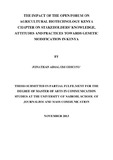| dc.description.abstract | Kenya is moving closer to commercializing its first genetically modified product – But cotton in 2014/2015. It is therefore very important for stakeholders to have credible and scientifically sound knowledge and information about genetic modification. This will enable them to make informed decisions about the safe use of genetically modified products. It is this role of empowering stakeholders with sound scientific information about genetic modification that OFAB Kenya Chapter considers as its primary mandate.
In the study, we have used the diffusion of innovations theory and the Technology Acceptance Model in the formulation of the theoretical framework to support our analysis and interpretations. The study has primarily investigated whether there are any knowledge, attitudinal and practical differences towards genetic modification between stakeholders who attend OFAB Kenya Chapter meetings and those who don’t.
Using the purposive sampling technique, we sampled a total of 95 respondents (48 OFAB attendees and 47 non-attendees) to generate our primary data through self-administered questionnaires. The collected data was cleaned, coded, input into a computer and analyzed using the Statistical Product and Service Solutions (SPSS) to generate frequencies, percentage distributions and cross tabulations used in our analysis and interpretations in our findings.
The study found that stakeholders who attend OFAB were more knowledgeable about genetic modification and therefore were generally more accomodative of using genetically modified products. Through this study, the OFAB Kenya Chapter has illustrated the merit of having knowledge sharing and awareness creation platforms when it comes to influencing stakeholder’s knowledge and attitudes about new agricultural technologies like genetic modification. The government and other development agencies therefore, need to offer more support for expansion of initiatives that are already delivering like the OFAB Kenya Chapter. They can also alternatively create vibrant and complementary agencies and forums that can operate across the country to ensure that all the stakeholders and the consumers are informed of genetically modified products when they finally get to the market. | en |

